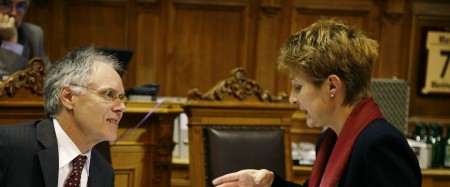
What do Rwanda, Sweden, Argentina and Finland have in common?
They are the world champions of women in politics. Women make up more than 40 percent of each country’s parliament. Switzerland just joined the club of the women-friendly elite on Wednesday. The Federal president, as well as the speakers of both legislative chambers, are women, and now the Federal Council, the executive organ of the government, has four women among its seven members.
Women’s strong showing in the Swiss executive branch is surprising for several reasons. First, it stands in sharp contrast to women’s representation in the legislature: there, women do not even reach the 30 percent mark – 28.5 percent of parliament members are women, while in the executive, they represent 60 percent.
Second, women only gained the right to vote in 1971. Yes, 1971. The country of humanitarian law and human rights allowed women to vote 51 years after Azerbaijan, 40 years after Sri Lanka and nine years after Afghanistan.
I congratulate members of the Swiss parliament for having elected another woman to the Federal Council to help ameliorate the shame that had made Switzerland look like an undemocratic country.
It can only encourage other countries that have only recently instituted women’s suffrage to believe that rapid progress really is possible.
On the same topic: Check out our recent Special Report “Closing the Gender Gap.”

